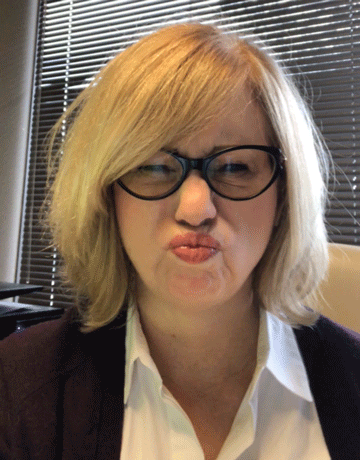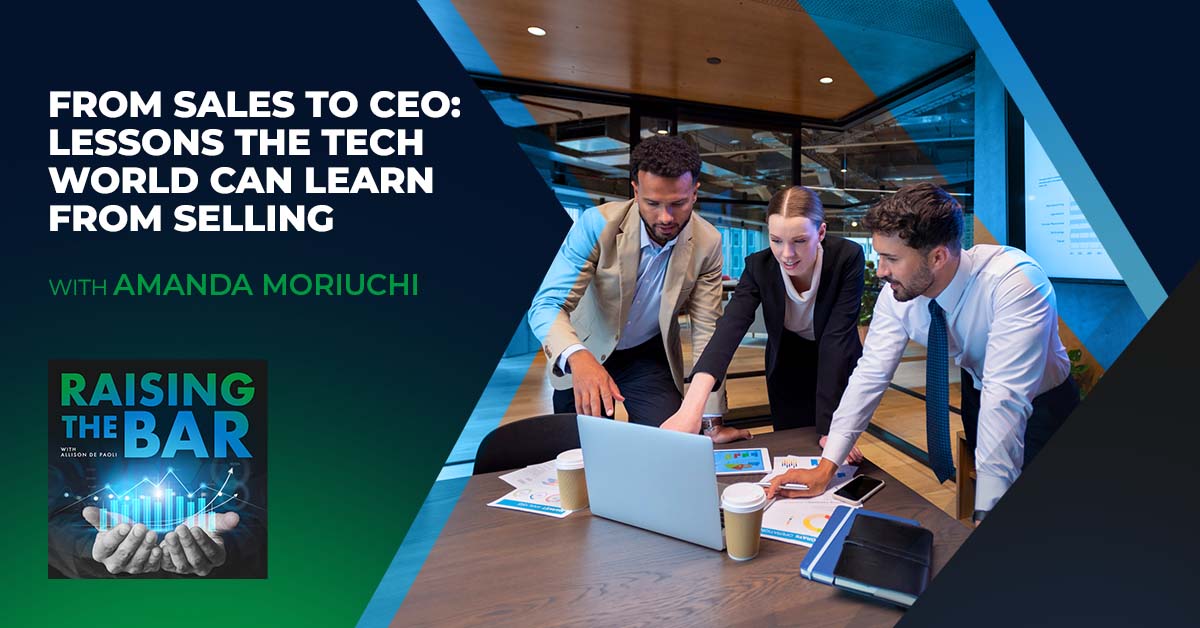
Every buying decision is personal. No matter what you are selling, you are making an impact on someone else’s life in one way or another. Amanda Moriuchi knows this fact intimately, having gone from selling homes to now selling technology. In this episode, she joins Allison DePaoli to share her career journey and the lessons she learned that created a huge impact on where she is today. Amanda is currently the CEO of one of the most successful female-owned tech development firms in the world, AppIt Ventures. She tells us about her rise to the top, the skills that helped her along the way, and the impact she is making. She also talks about how her experience as a salesperson helped her as a CEO, why business is hard, and how being mission-driven and having empathy are keys to success in this ever-changing tech landscape. With so much wisdom and insights, Amanda gives us a conversation that you won’t want to miss.
—
Watch the episode here
Listen to the podcast here
From Sales To CEO: Lessons The Tech World Can Learn From Selling With Amanda Moriuchi
It is my pleasure to have with me Amanda Moriuchi, who is the CEO of AppIt, which is a tech company that helps you build apps. She’s had quite a diverse background, and you’ll get a very interesting view into how early career choices impact later career choices. Thank you for being with me.
Thanks so much for having me.
You’ve been on quite a tour of shows lately and quite missional in what you’re doing. Will you talk a little bit about how you found your voice?
I had a friend of mine. She helped me. I had reached a plateau in my business. Sales had leveled off, and I didn’t know what to do. I’m a revenue driver by trade. I’ve been in sales my entire career. Reaching this plateau was a gut punch. I needed some help. My dear friend, Ashley, had recommended that I do personal branding, which I was very resistant to. I stepped way outside of my comfort zone. I worked with a group called the Brand Builders Group. They serve people nationally. They’re incredible. They have a system to help you get clear on who you are and why you do what you do. What breaks your heart? How are you uniquely positioned to serve your customers?
I had spent so much time in my career in sales learning about other people and seeing how I could help them that I didn’t spend very much time getting clear on who I am really. What do I value? What breaks my heart? What makes me mad? What gets me excited? That group helped put a voice in my heart. Since I’ve found my voice, I’ve enjoyed being on shows. If I can help someone else along their path, then I’ve done my work. That’s been fulfilling for me.
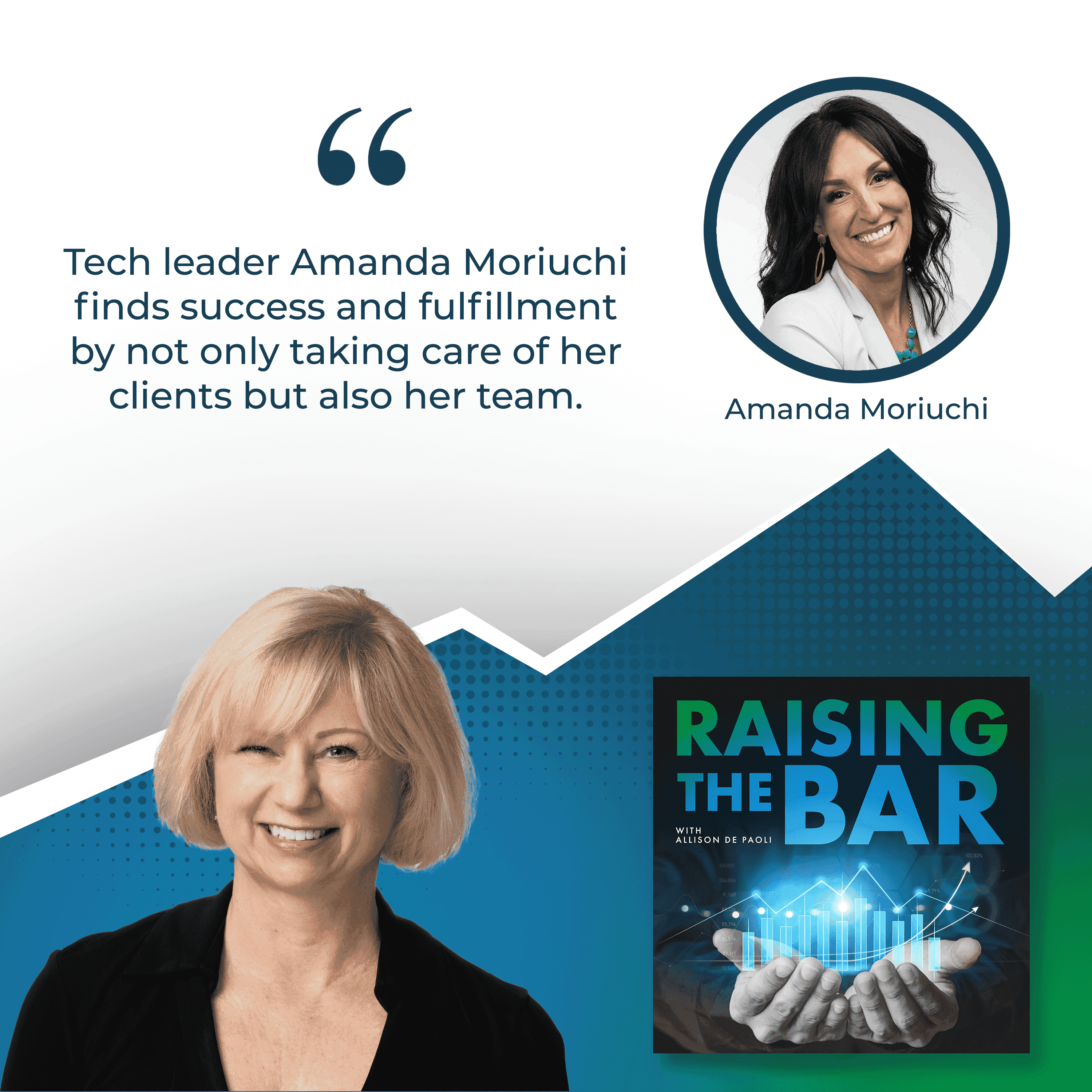
You were a marketing person. You sold homes for a while. You were very successful at that. Selling homes and selling cars is not the same thing, but they’re very personal relationships. If you can be successful selling homes, you are a salesperson. How have those skills helped you over time? You’re the CEO now, so you’re not necessarily responsible for sales. You are, but not the day-to-day.
I started my career selling homes. This was in 2005. We were living the high life at that point in time. This was right before the big short. It was a fun time to sell homes. At the end of the day, I was selling a physical product, YES Emotional. I was doing it in person. My sales manager and my mentor, Natasha, after the big short happened, brought me over to tech.
I went from a business-to-consumer sale, physical product in person, to technology services. I wasn’t even selling a product. I was selling custom software. This was right when the iPhone came out. This was the Wild West of technology. I had to quickly transition from B2C products in person to B2B sales services over the phone. I had to make sense of that.
How I started my career has what’s made me so successful in tech because it is personal. We’re working with people’s businesses and impacting them on a deeply personal level. If we mess up, the stakes are very high. It’s not all that different from screwing up a home sale. We’re dealing with intimate parts of people’s businesses. When we do it well, the results are stunning. It’s an adrenaline rush to help people be smart about how they use technology, so they can grow their businesses and dramatically improve their lives. It’s been an incredible career for me.
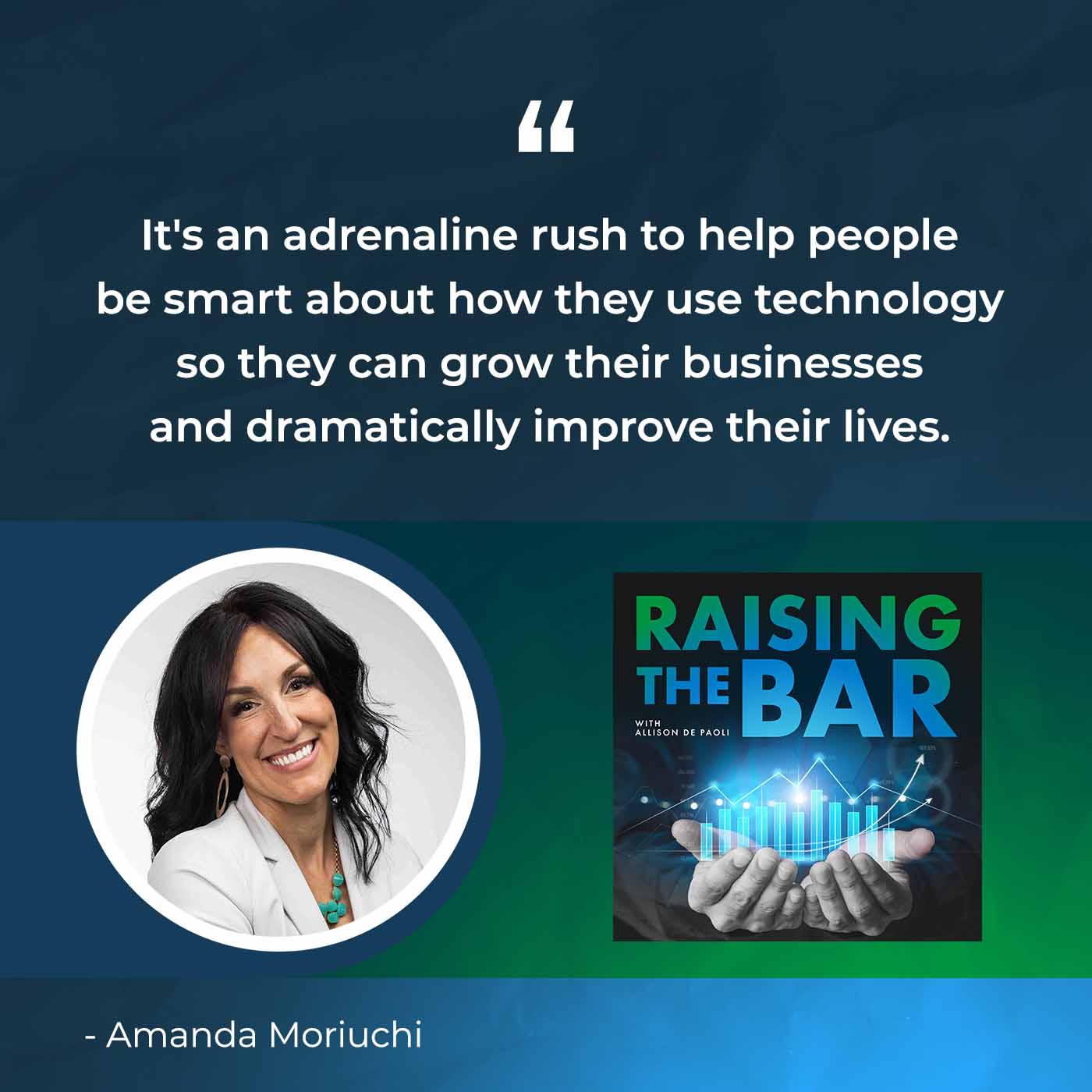
What is the most important thing you took from selling homes? There’s complete science on how you sell a house, but every buying decision is personal.
You hit the nail on the head. Every buying decision is personal. Starting in consumer product sales, which is what a house is, I learned to respect the emotion and the intimacy that goes into that. If you could carry that through any sales career, that behavior of respecting the intimacy and the emotional swings that happen when you’re making a buying decision, that’s what’s made me incredibly successful. Respecting the process of what somebody has to go through to make a buying decision is not easy.
On the tech side, coincidentally, building custom technology is not all that different than building a house. It’s a very similar process. All custom software developers follow a similar process, much like home builders do. That’s because there’s an order to things. You have to start the foundation before you do the framing. You have to do framing before you install plumbing and electrical. You have to do that before you do flooring and final finishes. It’s the same with technology. There’s a certain order in a process you have to follow.
All of us know there’s a fundamental difference between a national home builder. Think of a Richmond home or a KB home and a local high-end custom builder. We all understand the difference there. Knowing that and having that background has allowed me to be clear in explaining how we’re uniquely different in our industry, much like different home builders are different in their industry.
You are a tech leader now in Denver. You speak regularly. You also talk a lot to women who are building their own businesses. One of the things that you say that is very freeing is, “Business is hard. It’s okay. It’ll be all right. It’s just a little hard.” You’ve got some pretty solid principles around that. How did you come to those?
I am going through it myself. We are meant to do hard things. I don’t know quite when the switch flipped for me, and this was relatively recently. When I was in my twenties, coming up through college and early career, there was a trend about how you can have it all, life is easy, and you’re meant to be happy. There are times when things are easy for me, but the things that are easy for me now were hard once upon a time.
The things that are easy today were hard once upon a time. Share on XWhen I built my family and watched my children learn basics, the stuff that we take for granted. Any mom out there that’s gone through potty training will tell you, “How do you teach somebody the most basic skill that you take for granted?” Seeing your children struggle with learning how to do something that we take for granted so simply, everything that’s easy now was hard once. Going into any obstacle that I’ve come across, finding a way to trust myself, and then realizing I’ve made it through all of the hard things that I’ve accomplished. I’m like, “I don’t need life necessarily to be easy. I just need it to be fulfilling.” I must have shifted my priorities somewhere along the way.
When I was younger, the best piece of advice that I got, and I’ve heard it many times since was, “You can have everything. You just may not be able to have everything at the same time.”
Isn’t that the truth?
That was very freeing. Many people need to know that. I worked with somebody who was the primary caregiver for children. Occasionally, children would show up in the office because that’s what happened. He had a lot less guilt than most other people do about that, by the way. I find that very interesting. How did you come to AppIt?
By accident, largely, and relationships. When I was working in my previous custom software shop, this was in the early days. The iPhone had just come out. The Apple App Store had just come out. At that time, enterprises and large companies with a lot of funding were in R&D mode. They’re trying to figure out whether the App Store was even going to become a thing. Years later, entrepreneurs start to come into the marketplace.
Rob Carpenter is the Founder of AppIt. He worked with me as a partner. For the entrepreneurs at that point in time that I couldn’t serve because of cost or timing, I would refer them to AppIt. I loved how Rob and the AppIt team served these entrepreneurs. When I had moved on and taken my winding career path, Rob, in the meantime, had built up his new company. He had called me up and asked if I would take over the reins at AppIt. I had grown AppIt in the early stages of when I was coming in as a salesperson. He promoted me to CEO when I was four months pregnant.
I have to pause and acknowledge what Rob did at that moment in time because to promote someone five months away from maternity leave into such a critical role is something that never happens. You never hear that. The business is thriving, and I am thriving now because Rob had the foresight to do what he knew was right despite what was going on with circumstances at that point in time. He does deserve all the credit for that. It all comes down to I have built solid relationships over the years. I’ve maintained those relationships. When a need arises, and I’m in the right place to serve, that’s how my role at AppIt came to be.
What is the most surprising thing you found about being a CEO and not a salesperson? In some ways, they’re similar, but not.
I tell my sales team often, “Don’t be in such a rush to promote out of your role.” I miss the hardcore selling some days. It’s so nice to talk to customers and to have your finger on the pulse of the marketplace. That is such an exciting and invigorating place to be. As a CEO, you have to temper a lot of your enthusiasm and excitement being in the current marketplace with longer-term decision-making, data analysis, and making sure all parts of the organization are working together.
As much as I would love to sell and blow up the top-line revenue, you can’t do that all the time and serve your customers with the quality, attention to detail, and elegance that your customers deserve. My sales heart has broken a little bit in the CEO role, but I have a very full-bodied understanding and appreciation for my customers and my whole team.
How did you find your love of selling?
I joke around. I was born with the disease. I was talking with my CFO about a fun fact from our childhood. Fun fact from my childhood, I held the record for Girl Scout cookie sales for eight years. No one could touch me. I was born with that talent. My dad was a salesman. He was one of the best, most kind, generous, loving, and giving people on the planet, and also the best salesperson. He taught me that selling from a place of generosity and service is the only way to do it.
He instilled in me early on that sales is an honorable profession. The way you best sell is by serving first, then you can deal with acquiring skills or learning over time. I was born this way, and then I cultivated that skill because I do have a love of learning overall. I’m passionate about advancing a skill. It’s those two things.
What advice do you have besides, “Don’t be so quick to want to promote out of your role,” for people entering the sales arena? It is an arena. It can be fabulous and brutal.
1) Any job can be absolutely fabulous and brutal. None of us are immune to hardship. It’s going to come one way or the other. 2) I view sales as simply a series of conversations where decisions are made to either move forward or move on. That’s all sales is. If you think of sales as helping somebody make a decision from a place of service, it’s not what so many of us were taught selling is.
To take an inside-out view and to view it as, “I am helping somebody on their path. They may work with me. They may not.” In fact, in a sales role, 9 out of 10 times, if you’re the best salesperson on the planet, you’re not going to have somebody that you’re talking to be a customer. If you can be okay with knowing that you’re going to get 9 out of 10 people are going to say no, for me, at least it took the pressure off because I was like, “It’s probably a no. Let me get to know this person and see how I can help.”
Those are very transferable skills to being a CEO. You help people. You now have a whole team of people to help. Some of them are in sales, in accounting, in fulfillment, and very technologically oriented. How do you get into people’s skin that way? The best leaders that we see always figure out how to get into people’s skin and understand them.
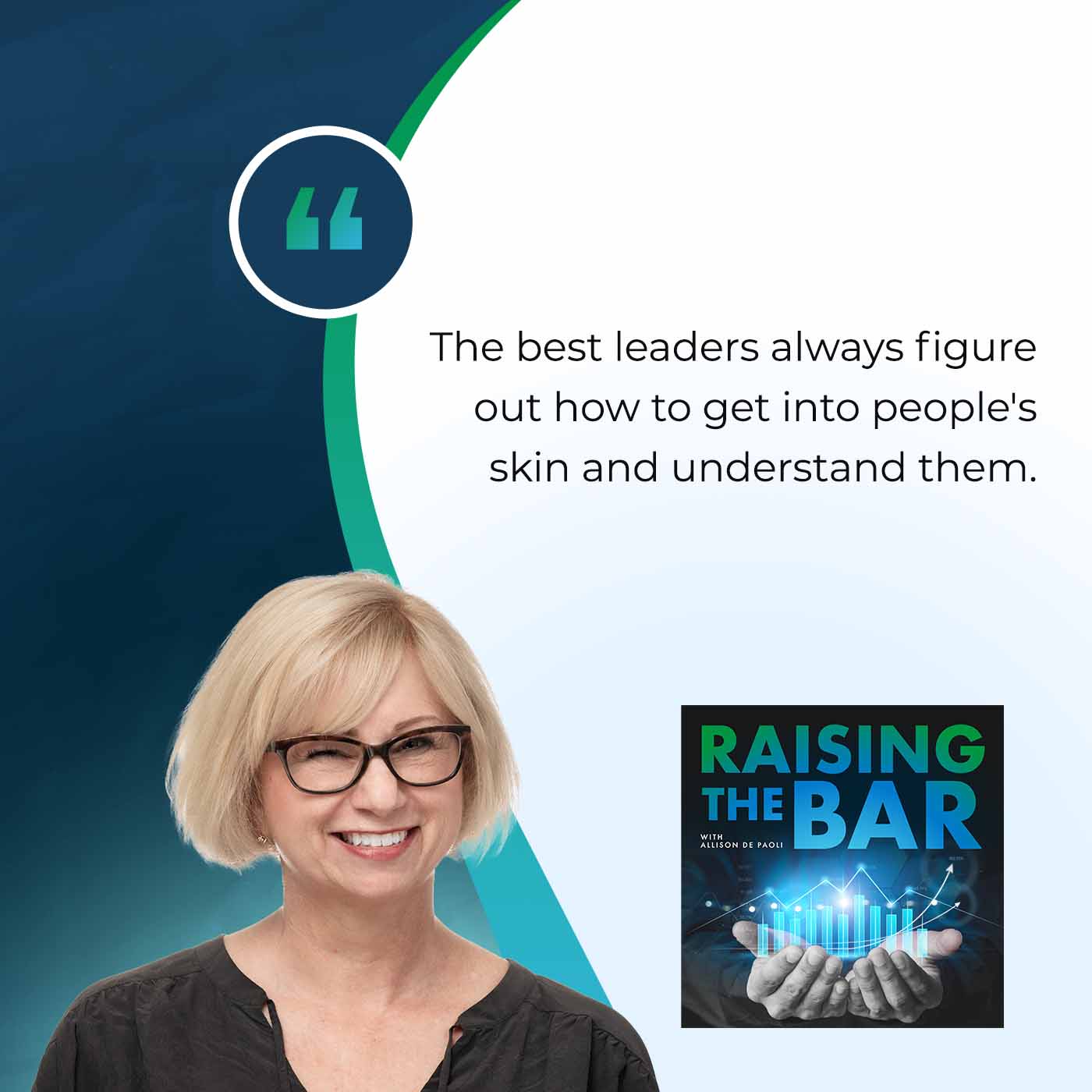
I was talking with a young professional about this. I believe that empathy is the greatest superpower. Take five minutes. Step outside of yourself for five minutes when you’re talking to somebody, see and hear them, absorb what they’re saying, and try to experience what they’re experiencing. At the very worst, you create space for that person. They walk away feeling like, “I felt heard and I can do more now because I needed a minute to be seen.” How often in a day-to-day conversation do you genuinely feel seen by somebody else? It’s pretty rare these days.
For me, I’m going to set aside all distractions. I’m going to see and hear this person for where they’re at. I’m going to ask more questions than I give advice on. It’s been a life-changing practice for me. That all started when my dad passed away. All of his friends were saying, “When Chris was around, you were the only person in the room.” I remember seeing how much my dad was loved and admired for that one trait. I decided that’s what I want people to say about me when I’ve passed. It’s that ethos.
That’s become the filter for decision-making. Do you still interact with customers?
As often as I can. I love it.
What is your favorite customer? Some people like analytical people. Some people like very articulate people.
One thing that we do at AppIt is training around the DiSC methodology. It’s similar to Enneagram or Myers-Briggs. It talks about if people are task-oriented or people-oriented and if they make fast decisions or slow decisions. I don’t have a particular personality type that I am drawn to. What I am drawn to though are the customers that are using technology to leave a positive impact in one way or another.
I am obsessed with the customers that don’t love technology for technology’s sake. It’s almost like they want to use technology so they can allow their team or customers to be more human. Those are my favorites. The ones that are like, “If I could automate this, then my employees can lighten their workload a little bit and maybe be more present with our customers.” Those are the customers where I get excited to help.
Those are often mission-driven organizations and can be quite profitable. I’m not talking about only nonprofits but, “I see this problem, this is a big deal to me, and I’m going to fix it.”
I would go so far as to say, our most profitable and most successful clients are mission-driven or purpose-driven, not nonprofits. They’re very clear about, “This is how we serve our customers and I want to be the best in caring for my customers.” That’s a powerful mission.
Often, the most profitable and successful clients are those that are mission-driven. Share on XWhat’s next for AppIt?
What we’re working on is serving thought leaders impact organizations and coaches, people or organizations that start with a core truth. They’ve built content around that core truth. They’ve started engaging followers, community, and audience around their core truth. I’m excited because the technology that we’re building for our customers protects their communities. They’re not reliant on big tech platforms.
Therefore, not exposing their community members to the risks of being on a big tech platform. Each of these businesses is slowly repairing the damage that social media at large has done to our community. I’m so proud to be working with these organizations because they’re repairing the damage that’s been done and reestablishing humanity, connection, and vulnerability in a way that is so elegant and powerful. That’s why I’m so excited to be working at AppIt these days.
Do you think that big tech will evolve into a less brutal environment? Do you think that it is simply not possible?
Anything is possible, but it’s funny, I have Good to Great on my bookshelf. I read Good to Great every year because each year I’m entering into Jim Collins’ mind with a different mindset myself. If you read about some of the companies that he highlighted as the stalwarts of the industry and the people that you should follow, these companies are either not in business anymore or dramatically smaller.
The reality is, when you get bigger, it’s more difficult to nimbly change. The nature of tech by itself is that it changes so quickly. You have to be able to innovate and respond. A lot of times that requires empathy organization-wide. The larger the organization, the more complex. I don’t necessarily think it’s impossible, but I trust. I always have. I trust in entrepreneurs and small businesses to innovate and to undo the damage of larger organizations that can’t innovate the way that they used to.
The nature of tech by itself is that it changes so quickly. You have to be able to innovate and respond. A lot of times, that requires empathy organization-wide. Share on XI’m in a different industry than you, but we have a similar problem. The very large players are simply unable to adjust their models. We’re starting to see more people want something that is a little more boutique, customized, personal, and not as shark-like.
That applies across the industry. Think about even the food service industry. If you had a choice to go to a mom-and-pop, family-owned restaurant that’s developed its recipes over generations or Applebee’s, which would you choose? It’s because as you’re smaller, you are so intimately aware of how your customers’ needs evolve over time versus respecting the process and the infrastructure that got you to the size that you are as a larger company or a chain. That’s why I will always love entrepreneurs in small businesses because we’re the ones that add color to the black and white of big businesses.
I had a communication challenge with a client and a vendor. Those things happen, so you just fix it. I was talking to the vendor who owns the business and said, “I understand. It’s my name on the door, too.” Just because it’s my name on the door, it’s the customer’s name on the door. They went out of their way to fix it. That would have never happened with a large entity. How do you keep that as you grow because you’re growing?
We are growing. For me, it’s been who I choose to ask to join the team. I am still very close and hands-on with not only hiring and interviewing but training. My training model with every teammate on my team is, “You need to understand the heart that I have for our clients. The way that you interact with our clients is a representation of me and my heart and how I want our customers to leave feeling after they’ve interacted with us.” That’s a lot more personal than just, “Here’s your onboarding checklist. Here’s your employee handbook. These are our quarterly financial results. What are your OKRs for the quarter?” or whatever these silly corporate things that people use. It’s more than that.
I don’t think that we will ever be big enough that we will forget that the sole reason we exist is for our customers. We are a service organization, so we have to have a heart for service every single day. I don’t see that changing. I also think that’s why, as a services organization, you don’t see professional services organizations get as large as some of these more product-based companies. I will never be too big to care about our customers.
What is your biggest professional goal outside of growing AppIt?
I’ve been on this kick about wanting to see our clients get rich. There’s a book called The Science of Getting Rich, it’s by Wallace Wattles. I talk about this book a lot because it changed everything for me. In that book, he talked about how it’s your duty to get rich. The reason why he thinks it’s your duty to get rich is because the process to go from not being rich to being rich demands so much personal growth. As you grow, the pursuit of your goals changes other people around you for the better. When you get rich, you show all of those people around you that it’s possible to get rich. Therefore, it inspires them to get rich themselves. He says it’s not only honorable but your duty.
For me, in our success, I start to look for our clients and motivate them to be like, “I want to make you rich because it’s good. Money is good. It is not something that will ruin you as a person. It’s a magnifier. I want to see your goodness and impact magnify out, ripple out, and make positive change.” In every area of our society, so many of us are desperate for encouragement, inspiration, creativity, and connection. My biggest goal is to support our clients in their work so they can spread that out.
That’s quite a goal.
It’s a big one.
We are pretty personally invested in our clients, and I’m always like, “Are we too invested in our clients?” We are not.
I don’t think there’s any such thing. There is pride of workmanship. There’s so much value in doing good work. There’s an impact that comes from doing a good job and caring. I have not seen a downside yet in caring more than the next person. Maybe a little bit of stress, but I’d rather take that than not.
There is so much value in just doing good work. There is an impact that comes from doing a good job and caring. Share on XWe are pretty invested in our clients, and it’s a pleasure to be invested in them. We’re not huge, but it’s satisfying for all of us. How do you communicate that to your team?
Since the pandemic, we have been largely remote. We were locked down for a pretty significant amount of time, and all of us got so used to working remotely. We struggled for a while to find our groove in terms of how we remain connected to each other. We’ll spend the first 5 to 10 minutes of every meeting connecting on a human level and what’s going on in your world. My team is so funny. I wish I was funny. I don’t contribute to the sense of humor across my entire team, but keeping that connection in those first ten minutes of each meeting. That’s helped us remain connected and remember if we care for each other, our clients are going to be cared for as well.
I’m very clear on, “These are the behaviors within our team that make you successful. If you’re successful, our clients will be successful.” The last piece is I care to make sure my team was compensated fairly and clearly. My hypothesis was if I remove the financial stress, the job stress, and the fear that I’m going to be a mean boss if I created a positive work environment, my teammates would naturally do their best work. Because my team knows I care for them deeply, they have the space to care for our clients deeply. It’s a lot mixed in there.
What I took from that is something that I see in our most successful clients. They care very much about their clients, but they care about their teams more. As they express that, business performance continues to improve. It comes out in a different way with every person because people are individuals. That is very good advice. Thank you very much.
Do you remember The Four Agreements by Don Ruiz? There was something in there because it was on his talking about, “Don’t take anything personally.” He had a thought in there that, if you’re ever in a bad mood, are you going to give a compliment when you’re in a bad mood? The answer is no. You’ll give a compliment when you’re in a good mood. Applying that to even exercise, are you going to put your best effort forth during exercise if you haven’t eaten well or rested well? The answer is no.
As a leader, if I expect my team to do their best work, then it’s my responsibility to create the most ideal environment for them to do that work. Part of it is respecting who they are as professionals. Another part is I have an affection for everyone on my team. I genuinely love, admire, and respect every single person on my team. That mutual understanding is what creates the space for them to do their best work. That’s been a bit of a gift in terms of the mindset that I’ve carried into this role.
As a leader, if you expect your team to do their best work, then it is your responsibility to create the most ideal environment for them to do that work. Share on XThat’s a huge gift, valuing people and telling them that you value them in several different ways. It’s not always money, praise, and time. It’s all the faith. We will leave it on that note. Value your teams, everybody, more than you think. Probably expressing yourself more is a better way to say it because I don’t know too many leaders that don’t value their teams. Thank you for joining us. For those of you that are tuning in, if you like the show, please leave us a review, and subscribe wherever you’re tuning in to this. It helps us spread the word. We will see you next time.
Important Links
About Amanda Moriuchi
 Amanda Moriuchi is the CEO of one of the most successful female-owned tech development firms in the world. With nearly two decades of experience working with premier startups, Fortune 500 companies, government agencies, and nonprofits, she wears her passion for helping clients access and apply the breakthrough benefits of technology on her sleeve.
Amanda Moriuchi is the CEO of one of the most successful female-owned tech development firms in the world. With nearly two decades of experience working with premier startups, Fortune 500 companies, government agencies, and nonprofits, she wears her passion for helping clients access and apply the breakthrough benefits of technology on her sleeve.
With hundreds of clients and nearly 1,000 custom applications to her credit, her insights have been featured in numerous major media outlets, including the likes of Forbes and Yahoo Finance. She has been recognized by Denver Business Journal as a 40 Under 40 leader, as a back-to-back finalist for the annual APEX CEO of the Year Awards, and for the company’s myColorado app designation as Project of the Year by the Colorado Technology Association. Her company is a top 1000 global company as rated by Clutch.


